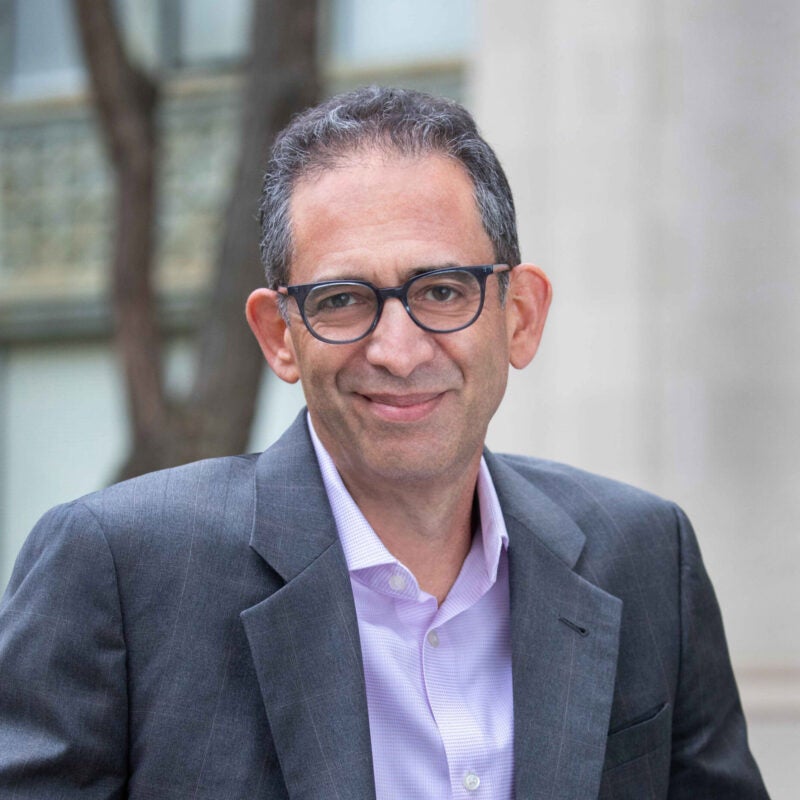John C.P. Goldberg, the Carter Professor of General Jurisprudence at Harvard Law, was recently honored for his scholarship in the field of tort law as the recipient of the Association of American Law Schools’ William L. Prosser Award, and the Civil Justice Scholarship Award from the National Civil Justice Institute.
Goldberg received the 2023 William L. Prosser Award for his contributions to the field of tort law by the Association of American Law Schools Section on Torts & Compensation Systems. The award recognizes outstanding contributions in scholarship, teaching, and service in tort law.
Goldberg was recognized alongside his longtime co-author, Fordham Law School Professor Benjamin Zipursky, at the AALS annual meeting in January. This was the first time the award was bestowed on two scholars for their joint work.
“Professors Goldberg and Zipursky’s influential understanding of tort law has garnered accolades, citations, and followers, even leading to the development of civil-recourse accounts in other areas of private law,” said a statement from the AALS. “Their scholarly success has earned them a reputation as foremost scholars of tort law among domestic and international audiences, partly due to their attentiveness to scholars from outside of the United States. Their acclaim and influence also stem from their willingness to engage with others while developing their work throughout their careers.”
The two, who were classmates at New York University School of Law, pioneered Civil Recourse Theory in tort theory in the late 1990s and early 2000s, and have been listed as the most cited torts professors in the United States. Their book “Recognizing Wrongs” (Harvard University Press 2020) has been widely acclaimed and their casebook, “Tort Law: Responsibilities and Redress” (Aspen 2021) (5th ed.) (with L. Kendrick & A. Sebok), has been used in law schools across the country over the past two decades.
“American torts scholars have been pushing the field forward for more than a century,” Goldberg noted, adding that “it’s truly an honor for the two of us to be placed in the company of the previous Prosser Award winners.”
In a statement for Fordham Law news, Zipursky said: “I feel especially gratified to have won [the Prosser Award] alongside my dear friend and longtime collaborator, John Goldberg. John and I began talking about torts together 34 years ago, as study partners in our first week of law school.”
Goldberg and Zipursky are also the recipients of an additional honor. The National Civil Justice Institute recently bestowed its Civil Justice Scholarship Award on “Recognizing Wrongs,” in which the authors explain the distinctive and important role that tort law plays in our legal system, defining injurious wrongs and providing victims with the power to respond to those wrongs through the courts. The Civil Justice Scholarship award recognizes current, scholarly legal research and writing focused on topics in civil justice, including access to justice and the benefits of the U.S. civil justice system, as well as the right to trial by jury in civil cases.
An expert in tort law, tort theory, and political philosophy, Goldberg joined Harvard Law School’s faculty in 2008 and served as a deputy dean from 2017 to 2022. In addition to the publications listed above, he is the co-author of two other books, and the author or co-author of dozens of articles and essays in scholarly journals. He has also won multiple teaching prizes. Goldberg currently serves as an Associate Reporter for the American Law Institute’s Restatements of Property and Torts, and as adviser on other Restatement projects, and is a member of the editorial boards of the Journal of Tort Law and Legal Theory.
After receiving his J.D. in 1991 from New York University School of Law, Goldberg clerked for Judge Jack Weinstein of the Eastern District of New York and for Supreme Court Justice Byron White. He earned his B.A. with high honors from the College of Social Studies, Wesleyan University. He also holds an M. Phil. in Politics from Oxford University and an M.A. in Politics from Princeton University. Before joining the Vanderbilt faculty, he briefly practiced law in Boston.
Want to stay up to date with Harvard Law Today? Sign up for our weekly newsletter.
